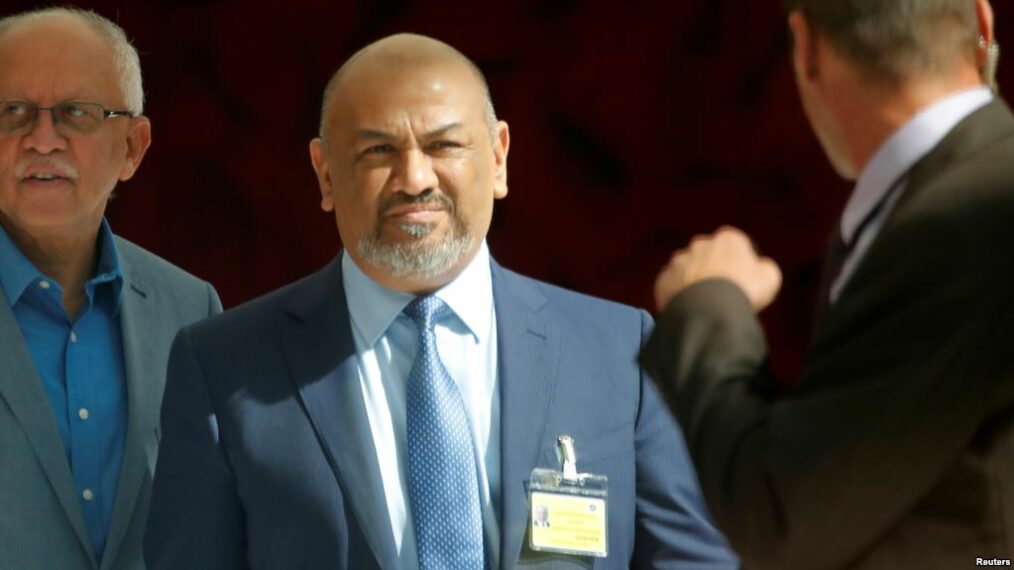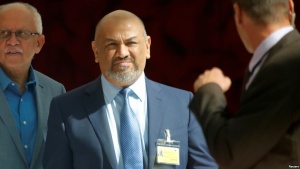
Yemeni Violence Escalates as Peace Talks Crumble

Yemen Foreign Minister Khaled al-Yamani walks in a hotel lobby in Geneva, Sept. 7, 2018. https://www.voanews.com/a/yemen-s-houthis-want-un-guarantees-for-delegation-as-peace-talks-stall/4562217.html
UN-sponsored peace talks seemed to provide a ray of hope for Yemen. But within hours of the talks stalling, air-raid alarms blared through the Yemeni city Hodeidah — confirmation that hopes for peace were misplaced. The dead include rebels, government officials, and civilians. The international community must find a way forward for the sake of Yemen’s people.
UN Resolution 2216 called for all parties — Houthi rebels, government representatives, and Saudi-coalition forces — to deconflict and participate in peace talks. The Houthis did not show up for peace talks, however. Unsurprisingly, this angered the Yemeni government. UN Special Envoy Martin Griffiths hosted talks with Yemen’s internationally recognized government despite the Houthi absence. They discussed prisoner releases, humanitarian aid logistics, and a timeline for re-opening the airport.
After three days of one-sided discussion and stalling, Griffiths confirmed that Houthis would not show.
Yemen Minister Khaled al-Yamani felt the UN failed to sufficiently pressure the Houthis to attend the talks and negotiate in good faith. As the rhetoric in Geneva intensified, the Houthis sent word that they skipped the talks because their transport and medical care access demands were inadequately vouchsafed. After three days of one-sided discussion and stalling, Griffiths confirmed that Houthis would not show. He suggested theirs was a logistical travel issue, not a political stance. Insisting that Ansar Allah (Houthi rebels) wanted to be present and were disappointed not to be, he vowed to reschedule talks at a location and time which has yet to be determined. He hopes to meet with Houthi leaders next week.
The talks would have been the first in two years of conflict in Yemen and they would have represented a step toward establishing safety and reducing the humanitarian crisis’s magnitude. Iranian-backed Houthis stormed Yemen in 2014, even taking control of the capital in Sanaa, plunging the country into violence. In 2015 Saudi-Arabia and its allies launched a strong military defense of the internationally recognized Yemeni government. In so doing, it escalated the situation and subjected more than 20 million civilians to the throes of a humanitarian crisis.
UNICEF has reported widespread hunger, disease, and violence impacting more than 11 million children. The EU has called Yemen the worst humanitarian crisis of our time. Yemen is one of the poorest countries in the Middle East. It has no resistance to the devastation the conflict has wrought. The Saudi coalition has bombed schools, hospitals, and infrastructure. As often as not, ammunition supplied to the coalition has come from the US and UK. Of comparable concern is the Houthi strategy of indiscriminately firing into cities and towns, terrorizing civilian populations, The Houthis have also planted hundreds of landmines.
UNHCR and Human Rights Watch have called for independent investigations into the actions of participants from all sides.
The crossfire has killed protected populations including activists, journalists, and aid workers in addition to civilians. Coalition and Houthi forces have stalled and stolen aid at the ports. UNHCR and Human Rights Watch have called for independent investigations into the actions of participants from all sides.
More than anyone, it is the people of Yemen who suffer as the Shia-affiliated Houthi and the Sunni-aligned Saudi coalition slug it out. Limited enforceable legal protections leave women and children especially vulnerable. It is critical that the peace talks move forward. Humanitarian aid and reconstruction in Yemen must resume at once.
